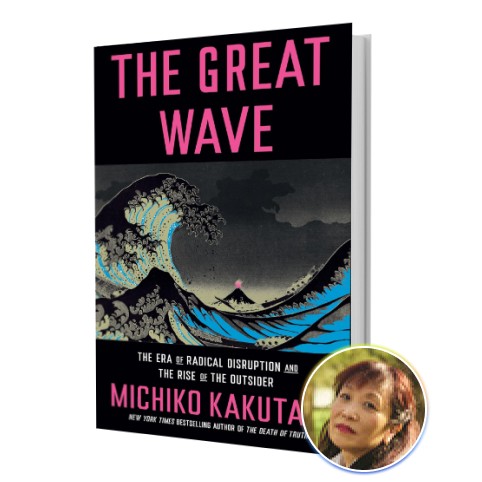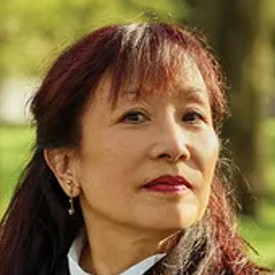Michiko Kakutani is a Pulitzer Prize–winning literary critic and the former chief book critic of The New York Times. She is also the author of the New York Times bestseller The Death of Truth and Ex Libris. Below, Michiko shares five key insights from her new book, The Great Wave: The Era of Radical Disruption and the Rise of the Outsider.

1. We’ve survived crises and chaotic times in the past.
It often feels like the world is being hit by a tsunami of cascading crises. Democracy is under threat at home and abroad. COVID exposed the vulnerabilities of an interconnected world. People are losing trust in longstanding institutions. And AI is threatening to flood an already truth-challenged world with an endless supply of fake images and fake news.
But we’ve been here—or close to here—in the past. While the world hasn’t faced a planetary threat like climate change before, it has navigated many historical eras filled with danger and uncertainty. Many countries have survived wars or other calamities and managed to rebound with remarkable resilience. In the wake of World War II, the destruction across Europe and parts of Asia was so great that 1945 was called “Year Zero,” and some nations faced what the historian Tony Judt called the “Himalayan task” of rebuilding their infrastructures and economies while embarking on far-reaching plans for social and political reform. Both Germany and Japan quickly reinvented themselves as democracies and key allies of the United States, and both experienced economic booms, becoming late-20th-century powerhouses on the global stage.
On a more local level, comebacks have become part of New York City’s DNA. Gotham rebounded after the 1970s, when it teetered on the brink of bankruptcy, and more than a million people departed, driven out by high crime rates and fears that the city was in irreversible decline. It rebounded again after the terrorist attacks of 9/11 caused death and destruction in lower Manhattan.
2. Don’t let the magnitude of social and political problems induce paralysis, and don’t let manipulative politicians catalyze cynicism and resignation.
It’s easy to think that problems like climate change or hate-fueled public discourse are too large to tackle in any practical way. Or to get so depressed by political corruption and shamelessness that you cease believing that your vote makes a difference. But this sort of resignation on the part of the public is how autocrats like Vladimir Putin stay in power—making the nihilistic bet that, with enough propaganda and misinformation, a weary, demoralized populace will resign itself to its fate and focus on their personal lives instead of public affairs.
In America, grassroots movements have demonstrated that they can deliver social and political change by reshaping public conversation. The Civil Rights Movement would lead to the passage of the Civil Rights Act of 1964 and the Voting Rights Act of 1965, laying the groundwork for the election in 2008 of President Barack Obama. The youth-led movement to end gun violence, launched by Parkland students in 2018, would lead to the passage of dozens of gun control bills on the state level—hardly a substitute for desperately needed federal legislation, but an important start that needs to be built upon.
“Resignation on the part of the public is how autocrats like Vladimir Putin stay in power.”
During times of crisis, visionary leadership can guide a country through an emergency while also rethinking policies and priorities in ways that address long-standing and seemingly intractable problems. In the 1930s, faced with a country reeling from the Great Depression (failing banks, bread lines, unemployment of nearly 25 percent) and the rise of Hitler abroad, Franklin D. Roosevelt went big with the New Deal, which not only rescued the flailing economy but reimagined the government’s social contract with the public and helped restore faith in democratic institutions.
3. Problem-solving in our interconnected world requires cooperation on national, regional, and global levels.
Urgent global issues require cooperation across borders so that scientists can share research, nations can agree on goals and regulations, and share technology and costs.
In the case of the Covid pandemic, Chinese researchers, who first mapped the genome of the virus, decided to post the sequence on an open-access site. As a result, researchers everywhere were able to immediately start working on vaccines. The public posting of the COVID-19 genome also helped epidemiologists assess what sort of risk the virus posed and how it might be contained. Many scientists hope this new culture of openness stays in place beyond the COVID crisis because speed and cooperation are crucial factors in fighting future epidemics.
A similar collaborative spirit between Republicans and Democrats would help the United States address many problems: it would reduce partisan gridlock in Congress, allowing for the passage of common sense legislation supported by a large majority of Americans. It would also help turn down the volume on the toxic partisanship that Donald Trump has stoked. This discord turned public discourse into a shouting match and divided Americans—the very thing that George Washington so presciently wrote about in his 1796 Farewell Address.
Washington warned of the “continual mischiefs of the spirit of party,” which are given to creating strife through “ill-founded jealousies and false alarms,” and the perils that factionalism (East versus West, North versus South, state versus federal) posed to the unity of the country. Citizens, he said, must indignantly frown “upon the first dawning of every attempt to alienate any portion of our country from the rest, or to enfeeble the sacred ties which now link together the various parts.”
4. Outsiders are on the rise and pursuing their dreams in America, as mistrust in elites and the status quo continues to grow.
Studies show that immigrants are twice as likely as native-born Americans to start new businesses and that more than half of top U.S. tech companies were founded by immigrants or children of immigrants—including Google co-founder Sergey Brin (who was born in Russia), Apple’s co-founder Steve Jobs (the son of a Syrian immigrant), eBay’s founder Pierre Omidyar (born in France to Iranian parents), Yahoo’s co-founder Jerry Yang (born in Taiwan), PayPal’s co-founder Peter Thiel (born in Germany), and Tesla and SpaceX co-founder Elon Musk (born in South Africa). Immigrants or children of immigrants also account for a disproportionate share of U.S.-based Nobel Prize winners and iconic 20th-century artists. Just think of the legacy of artists like Willem de Kooning, Mark Rothko, Piet Mondrian, Albert Bierstadt, Billy Wilder, Frank Capra, George Balanchine, Irving Berlin, George and Ira Gershwin, Harold Arlen, Jerome Kern, and Lorenz Hart.
Why have immigrants and other outsiders so excelled in science, the arts, and business? The reasons are many: an ability to draw upon multiple cultural traditions, a heightened sense of observation, an ability to think outside the box, and the sort of intellectual freedom that leads to innovation.
“More than half of top U.S. tech companies were founded by immigrants or children of immigrants.”
When I interviewed the writer and actor Sam Shepard in 1984, he said that much of what was applauded as innovative in his early experimental plays was simply ignorance of playwriting conventions. Having grown up on an avocado farm in a small town east of Los Angeles, he said the only “audience events” he’d seen before arriving in New York at the age of twenty were rodeos, Spanish fandango dances, and basketball games. As a result, he approached playwriting with few preconceptions and a sense that, in theater, “the rules are wide open.”
5. Chaotic hinge moments in history can provide an opening for a reboot, and possible renewal.
As the world’s quick reaction to COVID demonstrated, crises tend to spur people into action. While carbon emissions have not been reduced nearly fast enough to keep global warming below 1.5°C (as called for in the Paris Agreement), progress is being made as more countries and businesses embrace green energy. Now, it’s time to step things up further; to double down on shrinking our carbon footprint in substantial and innovative ways, and make individuals aware of the urgency of the situation and what they can do to make a difference.
In fact, times of turmoil can force countries and companies to reassess their priorities and operating principles. New ideas are more likely to gain traction during such periods, and newcomers are increasingly welcomed into once-cloistered fields. The scholar Gershom Scholem observed that such hinge moments can create “plastic hours,” meaning crucial moments when it is possible to act. He said, “If you move then, something happens.” What Scholem meant, his biographer George Prochnik explained, is that there are interludes when history is in volatile flux, “when migrations of peoples and changing political alliances dissolved the status quo,” and “radical transformation” becomes a possibility.
To listen to audio versions of Book Bites, download the Next Big Idea App today:































